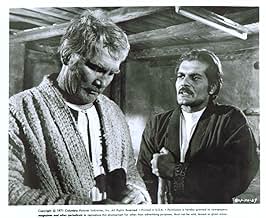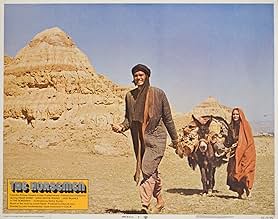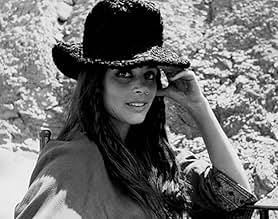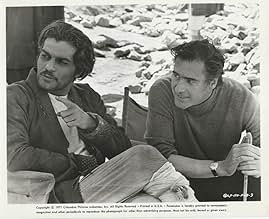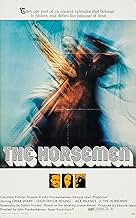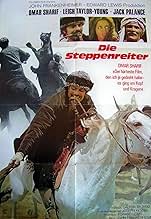AVALIAÇÃO DA IMDb
6,2/10
1,4 mil
SUA AVALIAÇÃO
Um drama que descreve a vida rural no Afeganistão contemporâneo e o amor do povo afegão por um esporte tradicional antigo semelhante ao polo a cavalo.Um drama que descreve a vida rural no Afeganistão contemporâneo e o amor do povo afegão por um esporte tradicional antigo semelhante ao polo a cavalo.Um drama que descreve a vida rural no Afeganistão contemporâneo e o amor do povo afegão por um esporte tradicional antigo semelhante ao polo a cavalo.
- Direção
- Roteiristas
- Artistas
Salmaan Peerzada
- Salih
- (as Salmaan Peer)
Aziz Resham
- Bacha to Ghulam
- (as Aziz Resh)
Vida St. Romaine
- Gypsy Woman
- (as Vida St Romaine)
Florencio Amarilla
- Arabian Man
- (não creditado)
Ishaq Bux
- Amjad Kahn
- (não creditado)
Carlos Casaravilla
- Messenger
- (não creditado)
- Direção
- Roteiristas
- Elenco e equipe completos
- Produção, bilheteria e muito mais no IMDbPro
Avaliações em destaque
Not having seen this film since its initial release, I have vague moments of recollection (I was eleven at the time) but, after all these years, I still remember this film, a few scenes-even the theater where I saw it-so that has to count for something. We, my parents, and myself went to many, many movies so it was not unusual for me to come along, even at decidedly adult fair such as this. My mother had a crush on Omar-notwithstanding that they share the same passion for bridge. Frankenheimer had a good reputation for producing and directing interesting, offbeat films that hit as often as they miss-The Manchurian Candidate, Grand Prix, and Black Sunday come to mind. So, we gave this film a shot.
While I do not remember the plotline to any great extent, what I do remember quite vividly was that this film took place in Afghanistan, and features quite prominently the national sport of Buzkashi-a sport whereby riders on horses attempt to deposit the carcass of a lamb in a circle. Also, this has what is quite honestly the best performance in a film by Omar Sharif you will ever find. He plays a great rider who is injured early in the film. He broads about a lot but finally finds redemption by returning to the sport that nearly killed him for that one last ride. I do not remember if he makes it through alive.
Buzkashi is an old, old brutal sport/ritual full of tradition and ceremony. The film took great pains to present this dying spectacle as realistically as possible and is the great set piece to the film. A true Man's man sport, it is not for the fainthearted. For me, at eleven, I was not used to cinematic `realism' even though by then I had seen hundreds of films. Perhaps it is why I remember it so for it made quite an impression.
The film was transferred to video but is long out of print and only available through collectors. It has not made it to DVD, unfortunately. I have not seen it since it initial release.
Still, in a long career for Frankenheimer, this is a film that should not be forgotten and is probably one of his best.
While I do not remember the plotline to any great extent, what I do remember quite vividly was that this film took place in Afghanistan, and features quite prominently the national sport of Buzkashi-a sport whereby riders on horses attempt to deposit the carcass of a lamb in a circle. Also, this has what is quite honestly the best performance in a film by Omar Sharif you will ever find. He plays a great rider who is injured early in the film. He broads about a lot but finally finds redemption by returning to the sport that nearly killed him for that one last ride. I do not remember if he makes it through alive.
Buzkashi is an old, old brutal sport/ritual full of tradition and ceremony. The film took great pains to present this dying spectacle as realistically as possible and is the great set piece to the film. A true Man's man sport, it is not for the fainthearted. For me, at eleven, I was not used to cinematic `realism' even though by then I had seen hundreds of films. Perhaps it is why I remember it so for it made quite an impression.
The film was transferred to video but is long out of print and only available through collectors. It has not made it to DVD, unfortunately. I have not seen it since it initial release.
Still, in a long career for Frankenheimer, this is a film that should not be forgotten and is probably one of his best.
Spectacular movie with exciting adventures , horse-riding and marvelous Oriental landscapes in the desolate , poor northern provinces of the mountainous feudal Sunni kingdom of Afghanistan . The story is suitably emblematic and talks upon a champion Afghan horseman named Uraz (Omar Sharif) who participates with his horse in an extraordinary national game of "buzkashi" dating back to the time of Genghis Khan . It is a fierce competition, played on the steppes of the northern Afghanistan , before the Soviet-engineered republican revolutions . His father named Tursen (Jack Palance) is too old and has got a crooked leg , while Uraz is even prouder and with a morbidly self-destructive , he needs to prove himself against deadly dangers . Later on , he undertakes a risked journey to regain the honor he has lost after his defeat in the ceremonial game . On the journeys he loses a leg , is confronted by his servant (David Keyser) and an untouchable girl (Leigh Taylor Young) who want murder him , besides a nomad (Peter Jeffrey) who struggles his scraggy one-horned sheep . Each meeting has within the seeds of his own meaning and predicament . The final spectacle , including Omar Sharif's double , of the horseman along with his stallion is breathtaking and overwhelming.
This stirring motion picture blends adventures , thrills , spectacular horse-game , emotions and is pretty entertaining . From the beginning to the end , the adventure and drama is continuous ; for that reason packs a lot of entertainment , though it balances ups and downs . With a cast of thousands and genuine Afghan extras , being shot on actual locations . Sets and production design are spellbound and the Oriental landscapes are mesmerizing . It is based on Joseph Kessel's 1967 novel, "Les Cavaliers" ("The Horsemen"), Kessel spent almost fifty years of his life roaming the world and being adapted by the black-listed Dalton Trumbo . The film began shooting using 65mm negative (Super Panavision), but during production, Columbia went through a change in management. The budgets for this and another 65mm production, "MacKenna's Gold," were cut, and both films were forced to switch over to 35mm anamorphic Panavisión ; however, both were released in 70mm, with the later-shot sections blown up. Colorful cinematography by Claude Renoir filmed on location in Afghanistan and Almeria , Spain , where in the 60s and early 70s were filmed a lot of Westerns .Two/three weeks into shooting, cinematographer James Wong Howe left the Project , due to disagreement with director John Frankenheimer over use of lens. Sensitive and fascinating musical score by George Delerue .
The motion picture is compellingly directed by John Frankenheimer . At the beginning he worked for TV and turned to the cinema industry with The Young Stranger (1957) . Disappointed his with first feature film experience he came back to his successful television career directing a total of 152 live television shows in the 50s. He took another opportunity to change to the big screen , collaborating with Burt Lancaster in The Young Savages (1961) and Birdman of Alcatraz(62) ending up becoming a successful director well-known by his skills with actors and expressing on movies his views on important social deeds and philosophical events and film-making some classics as ¨The Manchurian candidate¨, ¨Seven days of May¨ and ¨The Train¨ . The flick will appeal to Oriental adventure enthusiasts and Omar Sharif fans . Rating: Good , well worth watching
This stirring motion picture blends adventures , thrills , spectacular horse-game , emotions and is pretty entertaining . From the beginning to the end , the adventure and drama is continuous ; for that reason packs a lot of entertainment , though it balances ups and downs . With a cast of thousands and genuine Afghan extras , being shot on actual locations . Sets and production design are spellbound and the Oriental landscapes are mesmerizing . It is based on Joseph Kessel's 1967 novel, "Les Cavaliers" ("The Horsemen"), Kessel spent almost fifty years of his life roaming the world and being adapted by the black-listed Dalton Trumbo . The film began shooting using 65mm negative (Super Panavision), but during production, Columbia went through a change in management. The budgets for this and another 65mm production, "MacKenna's Gold," were cut, and both films were forced to switch over to 35mm anamorphic Panavisión ; however, both were released in 70mm, with the later-shot sections blown up. Colorful cinematography by Claude Renoir filmed on location in Afghanistan and Almeria , Spain , where in the 60s and early 70s were filmed a lot of Westerns .Two/three weeks into shooting, cinematographer James Wong Howe left the Project , due to disagreement with director John Frankenheimer over use of lens. Sensitive and fascinating musical score by George Delerue .
The motion picture is compellingly directed by John Frankenheimer . At the beginning he worked for TV and turned to the cinema industry with The Young Stranger (1957) . Disappointed his with first feature film experience he came back to his successful television career directing a total of 152 live television shows in the 50s. He took another opportunity to change to the big screen , collaborating with Burt Lancaster in The Young Savages (1961) and Birdman of Alcatraz(62) ending up becoming a successful director well-known by his skills with actors and expressing on movies his views on important social deeds and philosophical events and film-making some classics as ¨The Manchurian candidate¨, ¨Seven days of May¨ and ¨The Train¨ . The flick will appeal to Oriental adventure enthusiasts and Omar Sharif fans . Rating: Good , well worth watching
Set in Afghanistan, John Frankenheimer's 'The Horsemen' is the story of a tribesman determined to rival his father at horsemanship
Uraz is sent by his father Tursen to win the traditional Royal Buzkashi on the field of Bagrami in the capital city of Kabul
Uraz on Jahil has to battle for control of a headless calf, carry it around a blue flag, and deposit it back in the 'Circle of Justice' thus signifying that he wins the king's pennant and remains as the master chapandaz of all Afghanistan During the tournament, opposing horsemen use their whips to urge on their horses and to hit the rider for the chance to snatch the heavy carcass
The motion picture turns around five well drawn characters: an angered son eaten up with vanity; a brave father who knew something worse than danger; a nomad woman whose touch defiles; a once loyal servant lusted for an 'unclean woman;' and a wager from the high passes of the East where 'men know how to forge fine weapons and use them well'
Uraz (Omar Sharif) deliberately chose to bribe his devoted servant with the magnificent white stallion in order to increase the already terrible dangers which he hopes to conquer
Zareh (Leigh-Taylor Young) urges her man to kill his high blood master to secure for herself his horse and his money
Tursen (Jack Palance) know nothing but evil legends about an impossible road taken by his embittered son His pain, remorse, and blood wept for a son lost through his fault
Mukhi (David de Keyser) forgets his humble and faithful world in the arms of the 'untouchable' woman who pushes him to murder the great prince
Hayatal (Peter Jeffrey) takes the challenge against 'the Prince Ram of the Valley' declaring openly to Uraz: 'What a one-horned ram can do, a one-legged chapandaz can do better!'
To understand 'The Horsemen' you must understand the rage, the beauty, and the tradition of a mountainous and landlocked country, isolated and left outside the mainstream of civilization
Written by Academy Award winner Dalton Trumbo (The Brave One, Best Original Screenplay, 1956) 'The Horsemen' is a passionate film for men only The film is a search that marks out the true concepts of honesty, integrity, loyalty, and trust
Uraz on Jahil has to battle for control of a headless calf, carry it around a blue flag, and deposit it back in the 'Circle of Justice' thus signifying that he wins the king's pennant and remains as the master chapandaz of all Afghanistan During the tournament, opposing horsemen use their whips to urge on their horses and to hit the rider for the chance to snatch the heavy carcass
The motion picture turns around five well drawn characters: an angered son eaten up with vanity; a brave father who knew something worse than danger; a nomad woman whose touch defiles; a once loyal servant lusted for an 'unclean woman;' and a wager from the high passes of the East where 'men know how to forge fine weapons and use them well'
Uraz (Omar Sharif) deliberately chose to bribe his devoted servant with the magnificent white stallion in order to increase the already terrible dangers which he hopes to conquer
Zareh (Leigh-Taylor Young) urges her man to kill his high blood master to secure for herself his horse and his money
Tursen (Jack Palance) know nothing but evil legends about an impossible road taken by his embittered son His pain, remorse, and blood wept for a son lost through his fault
Mukhi (David de Keyser) forgets his humble and faithful world in the arms of the 'untouchable' woman who pushes him to murder the great prince
Hayatal (Peter Jeffrey) takes the challenge against 'the Prince Ram of the Valley' declaring openly to Uraz: 'What a one-horned ram can do, a one-legged chapandaz can do better!'
To understand 'The Horsemen' you must understand the rage, the beauty, and the tradition of a mountainous and landlocked country, isolated and left outside the mainstream of civilization
Written by Academy Award winner Dalton Trumbo (The Brave One, Best Original Screenplay, 1956) 'The Horsemen' is a passionate film for men only The film is a search that marks out the true concepts of honesty, integrity, loyalty, and trust
This is an example of taking a book and adapting it to the large screen and realising with hindsight that it works better as a book . I'm not familiar with Joseph Kessel's original novel but the comments on this page state that the film is very faithful to the book and that might be the problem . It's a story that concentrates on obsession at winning at all costs and Uraz the protagonist is a universal metaphor for all mankind that when you want to win something it can cost you very dearly
You can perhaps see why the producers thought this would make a great film with its exotic locations and the fact it was st in Afghanistan before the land reforms the mid 1970s that led to civil war and the subsequent Soviet intervention is what made me seek out the film if only to understand Afghan culture better and the film does contain an intelligent opening when the audience are led to believe they're watching a scene from the 17th Century only to the Afghan rug pulled from under their feet as a jet plane screams over head . Likewise there's some spectacular scenes involving the sport of buzkashi where horsemen literally fight over the carcass of a dead goat and there's some impressive cinematography featuring the Afghan landscape but the inherent problem with the film is the character driven narrative which doesn't kindly lend itself to the medium of cinema
You can perhaps see why the producers thought this would make a great film with its exotic locations and the fact it was st in Afghanistan before the land reforms the mid 1970s that led to civil war and the subsequent Soviet intervention is what made me seek out the film if only to understand Afghan culture better and the film does contain an intelligent opening when the audience are led to believe they're watching a scene from the 17th Century only to the Afghan rug pulled from under their feet as a jet plane screams over head . Likewise there's some spectacular scenes involving the sport of buzkashi where horsemen literally fight over the carcass of a dead goat and there's some impressive cinematography featuring the Afghan landscape but the inherent problem with the film is the character driven narrative which doesn't kindly lend itself to the medium of cinema
Reportedly, John Frankenheimer bugged out of the post-production process of I Walk the Line as fast as possible to get to Afghanistan to film this. Also, Columbia went through a regime change and the budget on the film got slashed in the middle of things, necessitating the change from filming in 65mm to 35mm. And...it's kind of dull. Again. Just like The Fixer. Another prestige literary adaptation that has no real energy to it, The Horsemen isn't a complete failure of a film. It's just not as interesting as it should have been.
Uraz (Omar Sharif) is the son of Tursen (Jack Palance), a rich man and famous chapandaz, a rider in the game called buzkashi where a group of individual horsemen wrangle for a sheep's carcass to throw into a painted circle on the ground. It's apparently very big in Afghanistan. Anyway, the heart of the film is the father/son dynamic of Uraz feeling unworthy to live up to his father's expectations, made all the worse when Tursen gives Uraz his horse for a big buzkashi contest where Uraz gets thrown from the saddle and breaks his leg. He then must make a long journey, choosing to take the hard, ancient road, to prove his worth. Along for the ride are his servant, Hayatal (Peter Jeffrey), and the untouchable prostitute, Zareh (Leigh Taylor-Young).
Where this film is easily the most interesting is a look at rural Afghanistan, their customs, sports, and the landscape. I mean, I'd seen the use of a head in a sack for polo in The Man Who Would be King, but never the wrangling of a goat carcass for sport. The portrayal of traditional Afghani masculinity is also interesting through Uraz who has a deep distrust of modern medicine. When he wakes up from the accident on the buzkashi pitch, his leg is wrapped up in a white cast. How can his leg heal without the sun hitting it? So, he has Hayatal break it off and wraps up his wound with a page from the Koran because the Prophet's words should heal him. It, of course, does not work, and the film has this kind of detached, sympathetic view to a backwards man trying to make his way across a hostile landscape.
It's not that hostile, though. The travelogue aspects kind of wear out their welcome after a while with little to add after the first half hour or so. Instead, we get some character-based stuff around Uraz naming Hayatal as the heir to his horse should something happen to him, a background thing between Hayatal and Zareh that could be a romance, a ram fight they come across where Uraz bets on an underdog, and even looks back to Tursen trying to recreate a moment from his youth by trying to jump onto a small building with his horse, something he did in a buzkashi contest many years prior.
It's just...not that interesting. And, again, like in The Fixer, I think a large part of it is how lackadaisical the film is edited. There's no real drive. It's just kind of a journey across a baren wasteland as Uraz gets steadily sicker because he refused Western treatment of his broken leg. It's just not that engaging of a journey. There's added interest late in the film when he has to make a drastic decision to save his life, something that should make it pretty much impossible for him to expertly ride a horse ever again. Which he, of course, does.
I mean...it's fine. After the look at Afghanistan loses interest, there's not a whole lot else. Uraz's daddy issues actually get sidetracked for watching ram fights and dealing with subdued feelings for an untouchable prostitute. The tension around Hayatal trying to kill him for the horse kind of comes out of nowhere. When Uraz does finally get back to Tursen, having grown through his pain and loss, there's something to it. It's not deeply affecting or anything, but it makes sense. Enough connections have been made through the film for it to make sense on an intellectual level.
I think part of the disconnect though, is performance based. Jack Palance was not a bad actor (and I generally don't care about brown face stuff), but he trended very easily towards arch performances, and I think his performance as Sharif's father, aside from the fact that his old-age makeup is unconvincing and they look the same age, is too arch for this film which is generally more restrained (too restrained, to be honest). A big performance wouldn't be bad, but he just...doesn't fit.
So, this feels like another attempt by Frankenheimer to adapt literature handsomely. It's also another tail of self-destruction, though with a more hopeful ending than most. It fits his filmography and shows a certain ambition, but it also demonstrates how he could easily be lost in types of films he wasn't familiar with.
Uraz (Omar Sharif) is the son of Tursen (Jack Palance), a rich man and famous chapandaz, a rider in the game called buzkashi where a group of individual horsemen wrangle for a sheep's carcass to throw into a painted circle on the ground. It's apparently very big in Afghanistan. Anyway, the heart of the film is the father/son dynamic of Uraz feeling unworthy to live up to his father's expectations, made all the worse when Tursen gives Uraz his horse for a big buzkashi contest where Uraz gets thrown from the saddle and breaks his leg. He then must make a long journey, choosing to take the hard, ancient road, to prove his worth. Along for the ride are his servant, Hayatal (Peter Jeffrey), and the untouchable prostitute, Zareh (Leigh Taylor-Young).
Where this film is easily the most interesting is a look at rural Afghanistan, their customs, sports, and the landscape. I mean, I'd seen the use of a head in a sack for polo in The Man Who Would be King, but never the wrangling of a goat carcass for sport. The portrayal of traditional Afghani masculinity is also interesting through Uraz who has a deep distrust of modern medicine. When he wakes up from the accident on the buzkashi pitch, his leg is wrapped up in a white cast. How can his leg heal without the sun hitting it? So, he has Hayatal break it off and wraps up his wound with a page from the Koran because the Prophet's words should heal him. It, of course, does not work, and the film has this kind of detached, sympathetic view to a backwards man trying to make his way across a hostile landscape.
It's not that hostile, though. The travelogue aspects kind of wear out their welcome after a while with little to add after the first half hour or so. Instead, we get some character-based stuff around Uraz naming Hayatal as the heir to his horse should something happen to him, a background thing between Hayatal and Zareh that could be a romance, a ram fight they come across where Uraz bets on an underdog, and even looks back to Tursen trying to recreate a moment from his youth by trying to jump onto a small building with his horse, something he did in a buzkashi contest many years prior.
It's just...not that interesting. And, again, like in The Fixer, I think a large part of it is how lackadaisical the film is edited. There's no real drive. It's just kind of a journey across a baren wasteland as Uraz gets steadily sicker because he refused Western treatment of his broken leg. It's just not that engaging of a journey. There's added interest late in the film when he has to make a drastic decision to save his life, something that should make it pretty much impossible for him to expertly ride a horse ever again. Which he, of course, does.
I mean...it's fine. After the look at Afghanistan loses interest, there's not a whole lot else. Uraz's daddy issues actually get sidetracked for watching ram fights and dealing with subdued feelings for an untouchable prostitute. The tension around Hayatal trying to kill him for the horse kind of comes out of nowhere. When Uraz does finally get back to Tursen, having grown through his pain and loss, there's something to it. It's not deeply affecting or anything, but it makes sense. Enough connections have been made through the film for it to make sense on an intellectual level.
I think part of the disconnect though, is performance based. Jack Palance was not a bad actor (and I generally don't care about brown face stuff), but he trended very easily towards arch performances, and I think his performance as Sharif's father, aside from the fact that his old-age makeup is unconvincing and they look the same age, is too arch for this film which is generally more restrained (too restrained, to be honest). A big performance wouldn't be bad, but he just...doesn't fit.
So, this feels like another attempt by Frankenheimer to adapt literature handsomely. It's also another tail of self-destruction, though with a more hopeful ending than most. It fits his filmography and shows a certain ambition, but it also demonstrates how he could easily be lost in types of films he wasn't familiar with.
Você sabia?
- CuriosidadesThe film began shooting using 65mm negative (Super Panavision), but during production Columbia Pictures went through a change in management. The budgets for this and another 65mm production, O Ouro de Mackenna (1969), were cut and both films were forced to switch over to 35mm anamorphic Panavision. However, both were released in 70mm, with the later-shot sections blown up. In later years, the mix-and-match formats made restoration of the films more time consuming and expensive than if they'd been shot entirely in 65mm, and they were preserved in 35mm only.
- Erros de gravaçãoWhen Tursen (Jack Palance) has a flashback to one of his past victories, one can tell that he is swinging a phony, lightweight, stuffed goat carcass around when his horse jumps up on the mud hut.
- Citações
District Chief: What demon has possessed you to mock these good people with that piece of dog-bait?
Principais escolhas
Faça login para avaliar e ver a lista de recomendações personalizadas
- How long is The Horsemen?Fornecido pela Alexa
Detalhes
- Data de lançamento
- País de origem
- Central de atendimento oficial
- Idioma
- Também conhecido como
- The Horsemen
- Locações de filme
- Afeganistão(Exterior)
- Empresas de produção
- Consulte mais créditos da empresa na IMDbPro
Bilheteria
- Orçamento
- US$ 6.000.000 (estimativa)
- Tempo de duração
- 1 h 49 min(109 min)
- Mixagem de som
- Proporção
- 2.35 : 1
Contribua para esta página
Sugerir uma alteração ou adicionar conteúdo ausente



